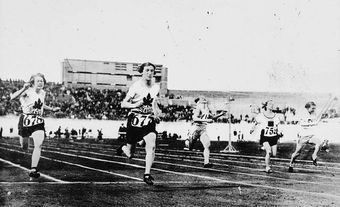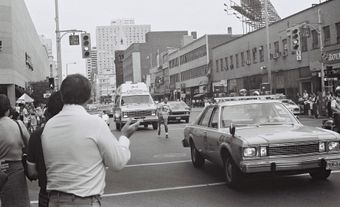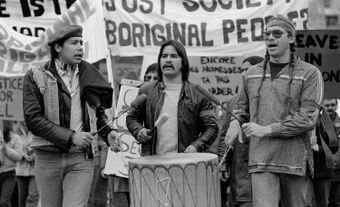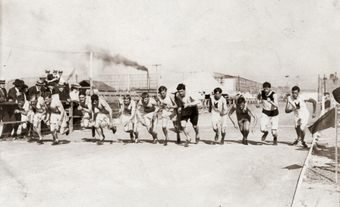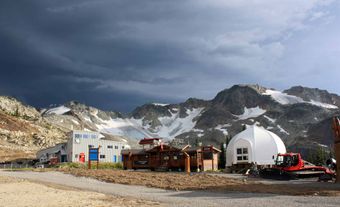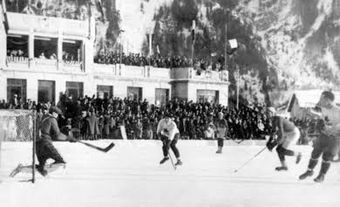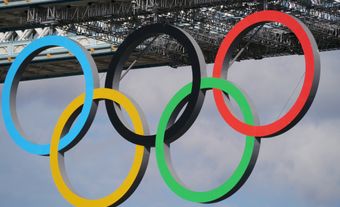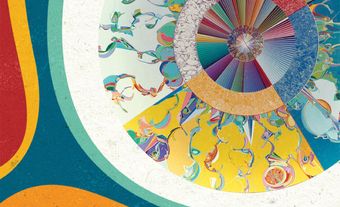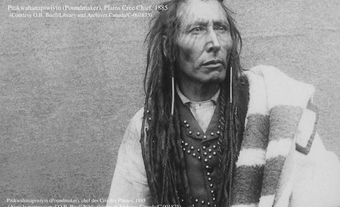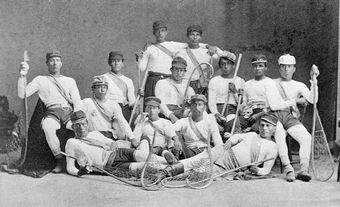Drawing inspiration from the Olympic Games in ancient Greece, the modern Olympics began in 1896. Like the Olympics, the Paralympic Games take place every two years, alternating between summer and winter sports. Indigenous athletes from Canada have competed at these games and brought home medals. They have represented the country in various sports at the Olympics, from long-distance running to skiing to water sports and more. This article explores some of the most notable Indigenous Olympians from Canada.
1. Tom Longboat (born 4 July 1886; died 9 January 1949; Onondaga)
Tom Longboat earned international attention when he won the 1907 Boston Marathon, taking five minutes off the course record. He also won the Toronto Ward's Marathon in 1906, 1907 and 1908, and the World’s Professional Marathon Championship in 1909. Longboat represented Canada in the 1908 Olympics in London. He was in second place and just 10 km from the finish line when he suffered exhaustion and collapsed. The next year, he won an international race at New York’s Madison Square Garden that earned him the title Professional Champion of the World.
The Tom Longboat Award was inaugurated in 1951 and is given each year to North America’s best Indigenous athlete. Canada’s Sports Hall of Fame inducted Longboat in 1955. (See also Notable Indigenous Long-Distance Runners in Canada.)
2. Kenneth Moore (born 17 February 1910; died 8 December 1981; Cree)
Ken Moore learned hockey at his school in Saskatchewan. As a speedy right winger with the 1930 Memorial Cup champion Regina Pats, he scored the winning goal with only 40 seconds remaining in the game. As a member of the Winnipeg Hockey Club at the 1932 Lake Placid games, Moore became the first Indigenous athlete to win a gold medal representing Canada at the Olympics.
Moore later enjoyed a successful coaching career and was inducted into the British Columbia Sports Hall of Fame in 1976 alongside his Kimberley Dynamiters teammates and the Manitoba Sports Hall of Fame in 2004. A humble man, Moore never spoke of his Olympic medal, but after his death his family repeatedly petitioned Canada’s Sports Hall of Fame to recognize his accomplishment with a much-deserved induction.
3. Shirley Firth (born 31 December 1953; died 30 April 2013; Dinjii Zhuh/Gwich'in) and Sharon Firth (born 31 December 1953; Dinjii Zhuh/Gwich'in)
Born in the Northwest Territories, the twin sisters, at age 12 began cross-country skiing with the Territorial Experimental Ski Training Program that developed athletic and leadership abilities among northern Indigenous youth. Two years later, in 1968, Shirley won a silver and Sharon a bronze medal at the Canadian Junior Cross-Country Championships. They eventually earned 79 medals in Canadian and World Championships. Beginning with the Sapporo Olympics in 1972, they are the only female skiers to have represented Canada in four consecutive Olympic games.
The Firth sisters were honoured with the Order of Canada in 1987 and, in 1990, they were inducted into the Canadian Ski Museum and Skiing Hall of Fame. In 2002, they were awarded the Queen’s Golden Jubilee Medal.
4. Alwyn Morris (born 22 November 1957; Kanyen'kehà:ka/Mohawk)
Alwyn Morris began paddling as a child. In 1977, he won the K-1 1,000 m and K-1 500 m junior national kayaking championships and, with partner Hugh Fisher, won a silver medal in the K-2 1,000 m race at the 1982 World Championships. They competed at the 1984 Olympics in Los Angeles and won a gold medal in the K-2 1,000 m and then a bronze medal in the K-2 500 m race. On the podium to accept his gold medal, Morris held an eagle feather to pay tribute to his Indigenous heritage and to honour his grandmother.
Morris won the Tom Longboat Award twice, became a member of the Order of Canada in 1985, and for the 2010 Olympics in Vancouver, carried the Olympic torch through Kahnawake Territory.
5. Colette Bourgonje (born 17 January 1962; Métis)

While in high school in Saskatchewan, Colette Bourgonje competed nationally as a cross-country skier but just before graduation, in 1980, a car accident left her paralyzed. At the 1992 Paralympic Winter Games in Barcelona, she won bronze medals in the 100 m and 800 m wheelchair races. She became the first female athlete to represent Canada at both the Summer and Winter Paralympic Games. Bourgonje retired after having won 10 medals in seven Winter and three Summer Paralympic Games.
In 2010, Bourgonje was presented with the Whang Youn Dai Achievement Award for her efforts in overcoming adversity in achieving excellence in sport and she was named Saskatchewan’s female athlete of the year. In 2019, Bourgonje was inducted into Canada’s Sports Hall of Fame. (See also Canada at the Paralympic Games.)
6. Angela Chalmers (born 6 September 1963; Sioux)

Angela Chalmers is a remarkable runner who won provincial races while a high school student in Manitoba and was then an 8-time All-American at Northern Arizona University. She won silver and gold medals representing Manitoba at the 1981 Canada Summer Games. She did not win a medal in the 1988 Seoul Olympics but won bronze for the 3,000 m race at the 1992 Barcelona games. Two years later, Chalmers won the gold medal in the 3,000 m race at the 1994 Commonwealth Games, setting a new Canadian and Commonwealth Games record. After retiring in 1997, she visited reserves across Canada, speaking with kids about Indigenous empowerment and working to reduce the dropout rate among Indigenous youth. She was honoured with many awards and inducted into the sports halls of fame in Manitoba and British Columbia.
7. Waneek Horn-Miller (born 30 November 1975; Mohawk)
Waneek Horn-Miller was an Ontario provincial champion swimmer at age 13. Her mother was a negotiator during the 1990 Oka Crisis and Horn-Miller cooked meals for the warriors. During a truce, while carrying her younger sister, Horn-Miller was stabbed by a soldier’s bayonet. She went on to lead Carleton University’s water polo team to two championships and was named the university’s female athlete of the year three times. She won 20 gold medals at the North American Indigenous Games. Horn-Miller led Canada’s water polo team to a gold medal at the 1999 Pan American Games and was co-captain of Canada’s team at the 2000 Olympics in Australia. In 2015, the Canadian Association for the Advancement of Women and Sport and Physical Activity named her one of the country’s most influential women in sport.
8. Brigette Lacquette (born 10 November 1992; Métis)

Brigette Lacquette grew up in the small northern community of Mallard, Manitoba and is a member of Cote First Nation. When only five years old, Lacquette demonstrated impressive hockey skills. She played at the University of Manitoba and then at the University of Minnesota-Duluth. Lacquette returned to Canada and anchored the Canadian team’s defense that won silver and gold medals at the 2009 and 2010 International Ice Hockey Federation U18 Women’s World Championships. In 2013, Lacquette became the first Indigenous player on Canada's National Women's Team. In 2017, she became the first Indigenous athlete to compete on Canada's Women's Olympic hockey team and helped win the silver medal at the PyeongChang Olympics. In 2019, Lacquette won the prestigious Indspire Award that honours Indigenous success and achievement and, in 2021, she became a scout with the Chicago Blackhawks.

 Share on Facebook
Share on Facebook Share on X
Share on X Share by Email
Share by Email Share on Google Classroom
Share on Google Classroom
